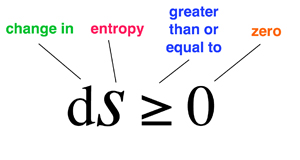RWNJ
Gold Member
- Oct 22, 2015
- 4,287
- 640
- 275
- Thread starter
- Banned
- #81
The second law of thermodynamics, as well as every other physical law, are part of the fabric of the universe. Neither can exist without the other.2nd Law of Thermodynamics rules out an eternal or infinite acting universe.What if the Universe has always been? In other words, it has no beginning. A theory states that there wasnt a need for a "singularity." It was "quantum potential" that collapsed.
So, we've got 2 choices, right?
1. The universe has always existed.
2. God has always existed, and God created the universe(s).
Can't imagine how anyone can rule out either option.
Only as long as the 2nd Law of Thermodynamics is/was in play. Maybe the universe has always existed, before that 2nd law came along.

